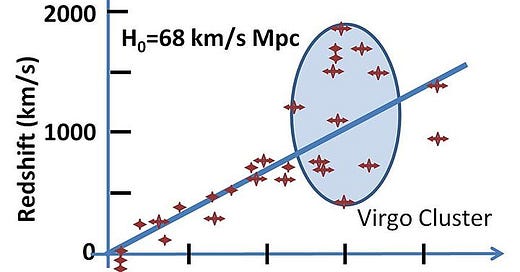[The image graphs Edwin Hubble’s theory of the acceleration of the universe in 1920]
Only after writing the essay on “theory” did it occur to me that the term is frequently misused to describe “conspiracy” claims
“Conspiracies” purport to explain the cause of some policy or practice but what they exhibit is the desire to have an explanation for whatever is the subject
In this way “conspiracies” are forms of belief and belief is always driven by desire
The “desire” here is NOT to “know” but to have an explanation for a selected policy or process; and the “explanation” is also aimed at showing there’s a hidden cause
To propose a genuine theory is to bring together observations so that a pattern or order can be shown to exist; “scientific” theories are confirmed by testing the phenomena to exhibit such patterns; this is the “scientific method”
Concocting a “conspiracy” starts with believing (which is the same as desiring) that there must be a hidden cause
Of course, whenever some patterns are observed, the curious mind aims to seek connections; these are what become theories
But the conspiratorial pattern is the contrary: what you don’t like has to be explained as something done on purpose
Religion is driven by the same desire as the belief there are conspiracies: to postulate a “hidden cause” (a diety or devil) for what you don’t like (or fear)
All religions promise “another life,” for example, because all humans fear death
Every “conspiracy” aims to show there is a “devil” (i.e., a hidden cause) for something one desires to destroy or at least explain away
When Edwin Hubble [1889-1953] discovered in 1920 that stars were moving away from the position of earth
I’ve before noted the effect of this discovery upon Einstein [1879 - 1955] who had assumed the universe to be fixed in the development of his relativity theories: when he learned of Hubble’s discovery Einstein said that assuming the universe to be stable was “the greatest mistake of my life”
My final point: no believer in conspiracy would recognize a belief to be in error when it is shown to be false
To believe is the opposite of desiring to know, thus beliefs are always an obstacle to knowledge…



